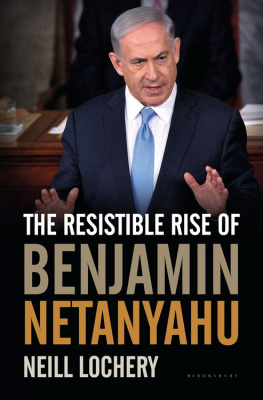
The Resistible Rise
of Benjamin Netanyahu
For my family, with much love
The Resistible Rise
of Benjamin Netanyahu
NEILL LOCHERY

First Plate Section
Second plate section
When the polls closed in Israel on 17 May 1977, the anchor of the Israeli television election coverage excitedly announced an upheaval. After 29 years in government in various guises, the Israeli Labour Party had been thrown out of power to be replaced by the Likud and Israels first non-leftist Prime Minister, Menachem Begin.
It was a crucial moment in Israels history, and since 1977 the Likud has become the natural party of government in the country. Its leaders all became prime ministers: Begin, Yitzhak Shamir, Ariel Sharon and the subject of this book, Benjamin Netanyahu.
In 1977, Benjamin Nitai (as Netanyahu was then called) did not reside in Israel and was working in the United States as a consultant for the Boston Consulting Group. He had previously completed four years of study, gaining a B.Sc. in Architecture and an M.Sc. in Business Management at MIT. To all intents and purposes he looked like a man who was heading for a successful corporate career in the United States.
Just under two decades later, he was elected Israels youngest Prime Minister and today the name of Benjamin Netanyahu is one of the most recognized on the planet. The story of his rise to power is one that has intrigued me since I first heard his name mentioned in the mid-1980s.
Since then, I have spent the best part of a quarter of a century researching and writing about Netanyahus career, and its impact on Israel and the rest of the world. While preparing to write this book, I went back and read my earlier writings and was surprised how different my assessment of him is today from when I started out all those years ago.
I think what has changed the most has been my perception of the sizeable disconnect between Netanyahu and of the country he has led for a greater length of time than any other Prime Minister, apart from David Ben-Gurion. Over the years, Netanyahu became more American and less Israeli, and not the other way around.
In many ways, Netanyahus story is that of an outsider: a man who didnt fit into the notoriously closed political and business elites in Israel. For all its successes on the battlefield, Israel has always possessed many of the characteristics of a small country with well-established elites protecting their positions against newcomers and outsiders.
Economically inefficient with high levels of political and business corruption, it has been a largely closed society even to new Jewish immigrants. Take away the military and Israel could easily resemble small European democracies such as Ireland and Portugal, with all the problems of nepotism and corruption that are associated with those countries.
The concept of the outsider remains very strong in Israel. Despite his prolonged period in office, Netanyahu remains an outsider to a vast number of Israelis: viewed as an American imposter who has taken over the country and tried to reshape it into a small political, economic and cultural outpost of the United States.
As a historian, I found this paradox of a man considered to be an outsider or foreigner emerging as the most important leader of the country in modern times truly fascinating. Furthermore, no matter how long Netanyahu remained in office, the notion of his being a stranger did not go away.
While I was writing this book I witnessed two examples of the perception that he does not belong to the tribe. The first was when he publicly started lecturing President Barack Obama in the Oval Office over the Iranian nuclear programme, and an Israeli politician said to me, Netanyahu is so not Israeli in his conduct with the President.
The second occasion occurred after Netanyahu won a largely unexpected victory in the Knesset elections in March 2015. The next day some Israeli members of my faculty at University College London were in tears, arguing that he, along with his wife, had somehow stolen the Israel that my colleagues belonged to and remained committed to preserving.
The debates, divisions and repercussions over the question of the ownership of Israel remain one of the most intriguing and unresolved issues of the Jewish state. To further complicate the issue, many of the same people who regard Netanyahu as an outsider or even an impostor at the same time look towards him as the goalkeeper of the state who offers protection against those who would willingly wish to damage or destroy it.
In short, many Israelis remain uneasy about Netanyahu, but see him as the best possible protection for the country that exists in an increasingly dangerous neighbourhood. One of the most interesting parts of the writing of this book has been to see how Netanyahu has cleverly and systematically played on the fears of Israelis in order to advance his own political career.
The fear factor has never been far away throughout the political career of Netanyahu, and for different groups of Israelis is best given in listed form:
1. Fear for personal security.
2. Fear for the security of the state.
3. Fear of making peace with the Arabs.
4. Fear of not making peace with the Arabs.
5. Fear of international isolation.
6. Fear of globalization.
7. Fear of increased religious extremism.
8. Fear of increased secular influences.
9. Fear of economic reforms.
10. Fear of economic decline.
Netanyahu has been able to invoke all ten of these fear factors, even when many of them were seemingly paradoxical. The basis for his rise has been his success in understanding what makes many political constituencies in Israel tick, tuning in to its fears and concerns about the present day and the future.
Before I started writing the book I made a list of the successes of Netanyahus career and his two periods in office, and tried comparing it with similar lists for other political leaders who had been in power for an extended time in the same era. The list for Netanyahu was very short.
The book is therefore not a study of success, but nor is it a study of failure. For many Israelis the litmus test is survival. By and large, Israelis remain pessimistic about their future prospects. Netanyahus older brother Yonatan, who died in the mission to rescue hostages held in Entebbe in 1976, summed this sentiment up in a letter to Benjamin in November 1975:
I feel profoundly apprehensive about the future of the Jewish state. Shedding illusions, I see that the process aimed at annihilating us is gathering momentum and the noose is tightening. It wont be a rapid process, though our strength will diminish from one war to the next. Theres a chance (just a chance) that we may come out of it whole, if we can manage to drag it out for a few additional decades.
For Benjamin Netanyahu the story of Israel, as well as his own career, has been all about survival. So success for him personally is not measured in the chorus of approval of the outside world, or in the signing of peace agreements. It is important to remember this point and how it is different from definitions of success or failure for American and European leaders.
As I researched and developed the book, I became intrigued how Netanyahu fitted into the history of Israel, and how his character and temperament were different from those of the previous leaders of the country. The book, as a result, provides a perspective on the history of Israel and the wider world during the Netanyahu era as well an insight into the man.
Next page












